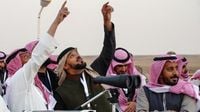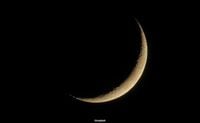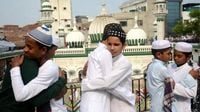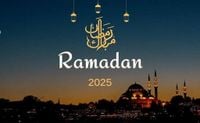Eid-ul-Fitr 2025: Anticipation Grows Amid Moon-Sighting Controversy
As Ramadan approaches its conclusion, Muslims worldwide are eagerly preparing for Eid-ul-Fitr, the festival that marks the end of a month of fasting. This year, Ramadan in India began on Sunday, March 2, 2025, following the sighting of the crescent moon on Saturday, March 1. Meanwhile, Saudi Arabia commenced Ramadan a day earlier, on March 1, 2025. The dates for Eid-ul-Fitr vary globally, largely dependent on local moon sighting practices.
Eid-ul-Fitr is expected to be celebrated in India on either March 31 or April 1, depending on the sighting of the crescent moon. If the crescent moon is visible in India on March 30 after Maghrib prayers, Eid will be celebrated on March 31. If not, the celebration will shift to April 1. Similarly, in Saudi Arabia, if the crescent moon is spotted on March 29, Eid will be on March 30; otherwise, it will be observed on March 31. This variability in dates highlights the significance of moon sightings in Islamic traditions.
The importance of moon sighting cannot be overstated. Eid-ul-Fitr, which translates to "festival of breaking the fast," is celebrated on the first day of Shawwal, the tenth month of the Islamic calendar. This festival signifies gratitude, community, and the conclusion of a month dedicated to fasting, prayer, and reflection. Approximately 70 days after Eid-ul-Fitr, Muslims will observe Eid-ul-Adha, known as the "Feast of Sacrifice."
However, this year, a moon-sighting controversy has emerged, particularly concerning Saudi Arabia. Astronomers have indicated that the crescent moon will not be visible from most parts of the world, including the Middle East, on Saturday, March 29, when many are expected to look for it. Critics have accused Saudi authorities of declaring Eid on days when it is scientifically impossible to see the moon. Such controversies have been recurrent, raising questions about the legitimacy of moon sightings reported by the kingdom.
In April 2023, for instance, astronomers challenged Saudi Arabia's declaration of the moon sighting for Eid, asserting it was scientifically impossible to see the crescent moon that evening. Prominent Kuwaiti astronomer Adel al-Saadoun famously stated, "I challenge anyone who sees it to photograph it as evidence." Despite these challenges, Eid was officially declared in Saudi Arabia shortly afterward.
This year, the Qatar Calendar House has forecast that the moon will reach its conjunction with the sun on March 29, making it impossible to see the crescent that day. His Majesty’s Nautical Almanac Office in the UK has corroborated this, stating that the crescent will be easily visible on Sunday, March 30. The UAE-based International Astronomy Centre has similarly emphasized that it will be impossible to see the crescent on March 29, further complicating the situation.
Saudi Arabia follows the Umm al-Qura calendar, which is based on calculations and pre-determines key dates years in advance. According to this calendar, the first day of Shawwal, marking Eid al-Fitr, is expected to fall on Sunday, March 30, 2025. This reliance on a predetermined calendar has led many experts to predict that Saudi authorities may declare Eid for Sunday, regardless of the crescent’s visibility.
Imad Ahmed, founder and director of the New Crescent Society in the UK, has expressed concerns about the reliability of Saudi moon sightings. He stated, "We have noticed that Saudi are very willing to produce moon-sightings which are scientifically impossible. They do so regularly, and we can predict them because they mostly match the Umm al-Qura calendar, which doesn’t match lunar visibility." Ahmed's observations highlight the ongoing debate within the Muslim community regarding moon sighting practices.
In contrast, other countries, such as Turkey, also utilize a pre-calculated calendar but maintain transparency about their methods without claiming to have seen the moon. Ahmed noted, "Turkey’s calendar is pre-calculated and their formula is more or less the same as Saudi Arabia’s. But they’re transparent. They don’t claim they've seen the moon, like Saudi do. They're clear about what their formula is."
The upcoming moon sighting on March 29 is particularly contentious. Ahmed emphasized, "The moon will be impossible to see in Saudi, because it will be too thin and too low on the horizon for there to be sufficient light coming from it. Even a telescope could not detect it." This scientific perspective raises further questions about the legitimacy of any moon sighting declarations made by Saudi authorities.
In countries like the UK, the variability in moon sighting practices has led to divided communities. While many British Muslims follow Saudi Arabia's lead, others look to Morocco or engage in local moon sightings. Ahmed's New Crescent Society aims to unify the Muslim community in the UK, stating, "Our goal is to unite the Muslims of the UK. We're trying to bring the moon back home." This initiative reflects a growing desire among younger generations for unity and an end to divisions within the community.
As the moon sighting date approaches, it remains to be seen how Saudi Arabia will navigate this controversy. The possibility that the moon-sighting committee may announce a sighting on March 29, despite scientific evidence to the contrary, could signify a historic shift in policy. The implications of this decision could reverberate throughout the Muslim world, affecting how Eid is celebrated in various countries.
In summary, the anticipation for Eid-ul-Fitr is palpable, but the moon sighting controversy casts a shadow over the celebrations. As Muslims around the globe prepare to mark this significant occasion, the reliance on moon sightings continues to spark debate and division within the community. With the date of Eid still uncertain, many will be watching closely to see how the situation unfolds.





